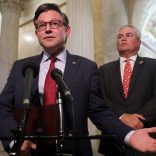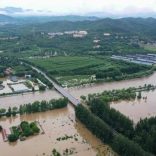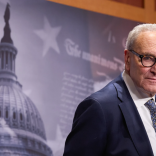Republican US House committee releases thousands of Epstein files
What is ‘snapback’? European nations’ Iran sanctions move explained

FILE - An Iranian flag in front of the reactor building of the Bushehr nuclear power plant, 21 August, 2010. [File photo: AP]
Ten years after wide-ranging UN sanctions on Iran over its nuclear programme were lifted under a landmark deal with world powers, the economic measures are likely to be reimposed Saturday evening.
The so-called “snapback” of UN sanctions comes after the “E3” European group — comprising Britain, France and Germany — activated the unique mechanism in the 2015 nuclear deal, alleging Tehran was not meeting its obligations.
Western powers and Israel have long accused Tehran of seeking to acquire nuclear weapons, a claim Iran denies.
AFP explains what “snapback” means:
In 2015, the United States, the E3 trio, China and Russia signed a historic nuclear accord with Iran, which was enshrined by the UN Security Council in resolution 2231.
The deal, known officially as the Joint Comprehensive Plan of Action (JCPOA), saw the UN lift international sanctions against Iran in exchange for restrictions on Tehran’s nuclear programme.
Resolution 2231, which expires on October 18, includes a clause that allows any party to the deal to trigger a “snapback” of all sanctions on Iran in the event of flagrant non-compliance with the JCPOA.
Any state “participating” in the agreement can lodge a complaint with the Security Council if they deem another participant has significantly failed to respect the accord.
That notification starts a 30-day process, at the end of which UN sanctions are automatically reimposed, unless the Council takes action to extend the lifting of sanctions.
On August 28, the E3 triggered the snapback mechanism after slamming Iran for having breached several JCPOA commitments, including building up a uranium stockpile to more than 40 times the deal’s limit.
The hard-won 2015 deal has been left in tatters ever since the US unilaterally withdrew from it in 2018, during Donald Trump’s first presidency, and reimposed sanctions on Iran.
Following the US withdrawal, Tehran gradually broke away from its commitments under the agreement and began stepping up its nuclear activities. The situation has deteriorated further in the wake of the 12-day war between Iran and Israel in June, which also saw the US bomb Iranian nuclear facilities.
The war also derailed Tehran’s nuclear negotiations with the US that began in April and prompted Iran to suspend cooperation with the IAEA.
After reaching a new cooperation deal with the IAEA earlier this month, Iran on Friday said that inspectors of the Vienna-based UN body had resumed their work in the country.
While European powers have for years launched repeated efforts to revive the 2015 deal through negotiations and said they “have unambiguous legal grounds” to trigger the clause, Iran does not share their view.
Iranian Foreign Minister Abbas Araghchi on Friday said the European nations’ pursuit of snapback is “legally void, (and) politically reckless,” insisting the country had put forward several proposals to ease the standoff.
Iran’s President Masoud Pezeshkian said Friday Tehran would not leave the Nuclear Non-Proliferation Treaty in retaliation to sanctions being reimposed.
In concrete terms, global embargoes on ballistic missile technology, arms, nuclear equipment and banking restrictions that were lifted 10 years ago would be reinstated.
Ali Vaez, the International Crisis Group’s Iran project director, told AFP that snapback “will add to the burden of Iran’s economy, which already is in a difficult position”.
But “their impact will depend on how much of the sweeping measures they provide on paper is reflected in enforcement”, especially since China and Russia might “try to stymie their execution”, he said.
Arms Control Association expert Kelsey Davenport said that “the UN measures will have little economic impact, given the breadth of US and EU sanctions already in place against Iran”.
But she warned that reinstating measures “without a negotiating process in place risks Iran and the United States getting caught in an escalatory tit-for-tat”.












Leave a Reply
Be the First to Comment!
You must be logged in to post a comment.
You must be logged in to post a comment.